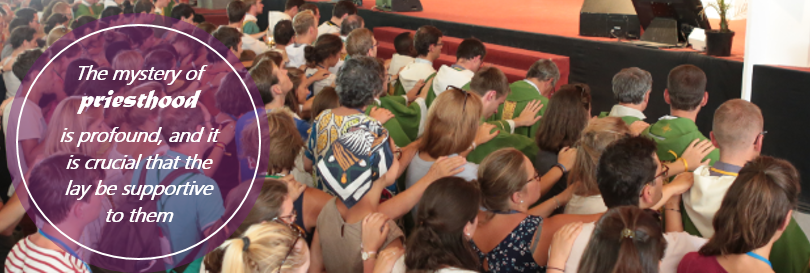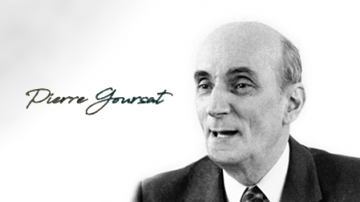Some points and questions that we can ponder on during the current crisis in the Church
Today the truth is out about a situation which we have not yet been able to fully grasp, at least not to the proportion to what has been revealed over the past few months. The first pedophile scandals in the Church became public in the United States, as well as in Ireland and Germany in the early 2000s. Almost 20 years later, new scandals have been revealed, this time more numerous, including more in the United States. Catholics know now that very problematic events took place within the church. We can now count the thousands of sexually abused victims over the past 50 years from priests and consecrated individuals, with sometimes the involvement of certain Bishops. In actuality, only a small percentage of priests are implicated in pedophilia. In the dioceses where real investigations were conducted, it is estimated that around 0.5% to 5% of all active priests from 1950 to 2000 were involved. It is, therefore, a minority, but is still significant and unacceptable. Among the priests and religious counted, some were real predators and left dozens of victims over the decades. As of now, the investigations are still ongoing, and this will take time.
From Shock to Acceptance of the Truth
From the first announced scandal, until today, we have all been immersed in some form of shock, including those with important responsibilities in the church. Is it even possible to imagine a priest being capable of committing such acts? We cannot, and we do not wish to believe it. We had all hoped that the drama would have only been minimal and that we would not have to worry about this. It took time for the light to shine upon the situation. Now we know that these extremely grim deeds were numerous and repeated. Many Catholics emerging from denial are horrified, wounded and disoriented. A certain number of individuals, believers and non-believers, are completely dismayed and have violently rejected the Church: “ If that is the face of God, I want no part of that!”. The deception is so cruel that the expectations are very high. Being faced now with such revelations, we have the right to ask: what is the amplitude of this phenomenon? What are the causes? Is it not something more of the past? What do we need to reform in the Church? Can we still put our trust in the church? How and why should we still love the Church? How should the priesthood exist today? Etc.
Avoiding a scandal
Now, the moment a new scandal becomes public, Christians say: “But why continue to share such awful news!?” This is exactly how the Church has chosen to respond for a number of years, focusing first on quieting the scandal. The victims and their family were sometimes the first to wish for the silence, so as to not risk feeling degraded in public and avoiding further pain.
In the Gospel, Jesus is not afraid of a scandal: “But whoever causes one of these little ones who believe in Me to sin, it would be better for him if a millstone were hung around his neck, and he were drowned in the depth of the sea. Woe to the world because of offenses! For offenses must come, but woe to that man by whom the offense comes!” (Mt 18:6-7, see also Lk 17:1-3 and Mk 9:42 and the verses that follow). Nowhere in the Gospel does Jesus justify hiding from the truth. On the contrary! “And ye shall know the truth, and the truth shall make you free” (Jn 8:32) or again “Therefore do not fear them. For there is nothing covered that will not be revealed, and hidden that will not be known. Whatever I tell you in the dark, speak in the light; and what you hear in the ear, preach on the housetops.” (Mt 10:26-27); and “For everyone practicing evil hates the light and does not come to the light, lest his deeds should be exposed. But he who does the truth comes to the light, that his deeds may be clearly seen, that they have been done in God.” (Jn 3:20-21). We cannot deny it. The fact of the matter is that the scandals going public provoke dramatic consequences. It is a powerful testimony against the Church that brings to a halt the spread of the Good News. The etymological meaning of the word scandal, is an offense; it is a stumbling block. We firmly believe that the individual who is responsible for the offense is not “he who does the truth” but only the sinner guilty of the act!
Why is it important to talk about it?
Talking has many virtues. First of all, it allows those that have suffered to use words to help express their pain. Certain victims start to tell the story of what they experienced when they were a child, sometimes many years after the fact, and being able to verbalize their story sets them free. The weight of silence is unbearable. For them, in the first place, it is but justice that their suffering is finally heard and taken into consideration. These liberating discussions allow the public to also understand the frightening consequences these victims have because of the abuse they endured. For a long time the burden they bore, was far too underestimated, as much in the Church as in Society. But…
Today we know: sexual abuse destroys lives! The Church has not always seen, been able to see, or wanted to see. The Church did not measure and sufficiently take into consideration the suffering of the victims, neither the danger that some of these tormenters could represent. How was the Church not more sensitive to the suffering of its children? Why did the Church not seek to be the Good Samaritan for the victims? Like the Levite in the parable, the institution seemed to be more preoccupied with its own matters than the wounded left along the way…Undoubtedly, being a victim of pedophilia is a deep secret, that is often expressed many years after. The largest number of pedophilic acts often take place within families…But it is shocking that the Church, whose mission is to live and give a preferential love to God, for the needy, was not able or did not want to see! We have to recognize: the organization was collectively responsible over the decades for silencing these secrets and even relocating the guilty priests. Thinking that had resolved the problem, but truly they were only putting other children in danger! Such decisions were taken by numerous bishops and religious leaders. This change in conscience, that was more than necessary, was also possible because the facts were made public by the media. The Church gratefully recognized the work of these journalists, who for the most part covered the stories in a precise and professional manner. Do not be afraid of the light! The truth will set us free! Jesus invites us to act. “If your hand or foot causes you to sin, cut it off and cast it from you. It is better for you to enter into life lame or maimed, rather than having two hands or two feet, to be cast into the everlasting fire” (Mt 18:8). Or “Moreover if your brother sins against you, go and tell him his fault between you and him alone. If he hears you, you have gained your brother. But if he will not hear, take with you one or two more, that ‘by the mouth of two or three witnesses every word may be established.’ And if he refuses to hear them, tell it to the church. But if he refuses even to hear the church, let him be to you like a heathen and a tax collector.” (Mt 18:15-17). Conversion and fraternal correction are at the heart of Jesus’s action plan, and if necessary, he says go ahead and make the wrongdoing public!
 Searching to understand the causes
Searching to understand the causes
To eradicate a phenomenon of this level, it is also important to look into understanding the nature, and the causes. It can be worthwhile, for example, to distinguish the cases of abuse for children, pedophilia, and the cases of abuse of young adults, ephebophilia. It most likely does not come from the same sexual deviance. For example, in the United States 80% of the cases where minors were abused, concerned puberty aged boys. In this country, the abuse is rooted for the most part in a homosexual attraction. This is a very complex subject, where scientific studies ought to be carried out.
In his Letter to the people of God, Pope Francis points out that clericalism is one of the causes of the pedophile scandals. Pope Francis explains that it is the possible breeding ground which favors the abuse of authority of all orders. Clericalism can be seen as a way of life particular to the clergy, and a way to exercise the power that was entrusted to them through their priestly ordination. Real power was entrusted to the bishops and the priests: it is Jesus himself who entrusted this power to his apostles, to their successors and collaborators. The power to administer sacraments, to announce the Word, and to govern the Church. Jesus wanted this sacrament of the order to ordain his body, to give him a form and a unity.
Vatican II proposes that the Gospel and the tradition, in particular, shed some light on this question. The priest is configured to Christ, head of the Church. At the same time, this power does not give him all of the powers. “But Jesus called them to Himself and said, “You know that the rulers of the Gentiles lord it over them, and those who are great exercise authority over them”, says Jesus (Mt 20:25). Sequestered, away from the people, priests can easily create their own “little universe”, organizing their life; however, they wish without the outside world looking in. This is how inconspicuously, and unexpectedly, the more vulnerable individuals did not benefit from a necessary structure to channel and educate their sexual impulses, unfortunately sometimes deviant, and some find themselves in situations where they have very seriously abused their power of authority. To be more accurate, lay persons can also be responsible for clericalism, as well as priests. Until recently, when someone tried to report an abusive situation, they would often be rebuffed by their community. Clericalism is, therefore, a problem for everyone, as much for lay people as for priests. So how can we most efficiently fight against clericalism? Not by “starting a revolution”, but more by converting and reinventing a style of life in the Church more conform to the Gospel. If we believe that the priesthood is a treasure, and we do, how can we make it to where it is lived out to what Jesus wanted it to be?
The priesthood: A very great gift!
During these troubling times, it is only natural that certain priests feel disoriented. Some are tired of hearing only of this, and worn out from being suspected of clericalism and of pedophilia. But deep down inside of themselves, if they are conscious of their weaknesses, then they are also proud to be priests. They have given their life for Christ and their brothers, at the price of numerous sacrifices. They give generously with their strengths, as well as their weaknesses. They know the benefits of an undeserved grace related to the choice of Jesus and their priestly ordination. Therefore, being associated with this horror infinitely weighs upon them. Let’s go a bit further. With this challenge, aren’t the priests evermore linked to Christ, the servant and Christ, the sufferer? In a way, doesn’t this crisis allow them to be even more loyal to their vocation? What a profound mystery!
Indeed, the mystery of priesthood is profound, and it is crucial that the lay be supportive to them. So what should we do? How can we support our priests without falling into a sterile and paralyzing submission? How can we enter into a fruitful collaboration for the mission of the Church? Therein lies one of the most vital points of improvement for the future mission of the Church! If the trust in the Church today is clearly reduced, the expectations vis-à-vis the priests are immense and will stay that way. The need for role models who can bring man up above himself will not pass. Priests will always be considered as men of God, notably from the individuals far removed from the Church.
How to announce the Gospel in this environment?
In this crisis, it is essential to ask what we need to change in the way we announce Christ. How can we still dare to preach “the good word” when ministers of the Church have committed such crimes?! Although, “For the Son of man is come to seek and to save that which was lost.” (Lk 19:10). More than ever, our evangelization should be humble and strong, and centered on the message of forgiveness, as Saint Paul said “This is a faithful saying and worthy of all acceptance, that Christ Jesus came into the world to save sinners, of whom I am chief” (1 Tm 1:15). Here again, we have a vital point for potential improvement. During each era, the Holy Spirit revitalized the way to announce the Gospel. It is up to each of us to reinvent a way to announce the joy of the Gospel today!
Letter of His Holiness Pope Francis to the People of God
Interview: Michel-Bernard de Vregille








